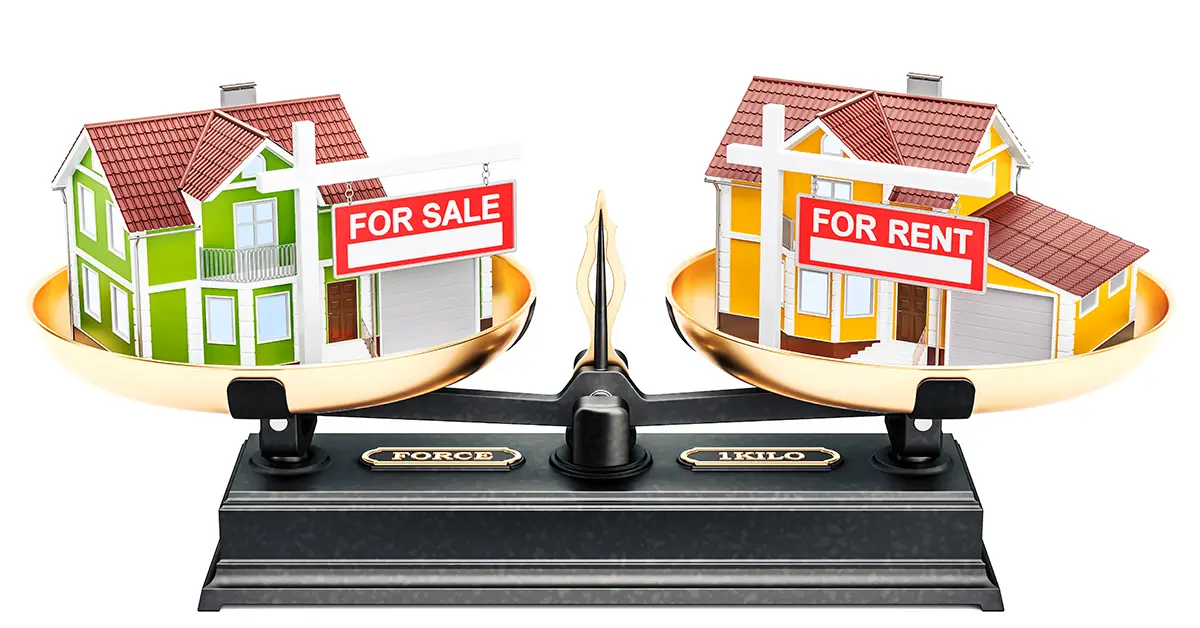
Renting vs. Buying a Home – What’s Better in 2026?
Choosing between renting and buying a home stands as one of the most important financial decisions we make. People who plan to stay put for five years or more usually find buying the smarter financial choice.
Looking at renting versus buying reveals several strong reasons that favour ownership. Homeowners enjoy stability, security, and freedom to customise their space without any landlord restrictions. Buying helps create long-term wealth since EMIs stay fixed while your income grows over time. Homeowners can also benefit from tax advantages under Sections 24 and 80C. Current housing loan interest rates hover around 8–9%, and some buyers may qualify for government subsidies like PMAY that offer up to Rs 2.67 lakh. Renters face a different reality with yearly rent hikes of 5–8%.
This piece will get into both options and help you figure out which path makes more sense based on your financial stability, priorities, and long-term goals in 2026.
When Renting Makes More Sense in 2026
Renting has become a smart choice in 2026. The gap between monthly ownership costs and rent remains high in many markets. Home prices might drop, but this gap won’t close anytime soon because new apartment construction helps keep rent increases under control.
Ideal for mobile professionals and short-term stays
Renting makes financial sense if you don’t plan to stay put for at least five to seven years. Young professionals in their 20s can explore career opportunities without being tied to one location. The mid-term rental market has grown to accommodate travelling nurses, corporate workers, and students who need semester-length housing.
Rent prices across the country have dropped 3% since their peak in August 2022, while home prices rose 9% during the same time. This relief in rent prices might not last long as apartment construction slows down through 2026.
Lower upfront costs and minimal financial risk
Getting started with renting costs much less than buying. You’ll typically need just one month’s rent as a security deposit. This is a big deal as it means that you won’t need the hefty down payment and closing costs that come with buying a home.
Renters save on utility bills thanks to more efficient floor plans. Renter’s insurance costs nowhere near what you’d pay for homeowner’s insurance. Best of all, you won’t face unexpected costs from property assessments, maintenance, and repairs.
Flexibility to relocate or upgrade easily
Freedom might be renting’s biggest advantage in 2026. You can live almost anywhere, including expensive cities like New York, where buying might be out of reach. Your career needs or priorities might change, and you can move without dealing with property sales.
This flexibility is a great way to get ahead as we move into 2026, with consumers becoming “smarter, pickier, and more mobile than ever”. Throughout 2026, more renters will be “right-sizing” – adjusting their living situations to different price points or markets as their needs change.
When Buying a Home is the Smarter Choice
Homeownership creates a financial asset that grows in value, unlike renting. Buying property in 2026 makes financial sense for people who plan to stay put.
Building long-term equity and asset value
Your mortgage payments build ownership in your property and work like a forced savings plan. Each monthly payment turns your housing expenses into actual assets. Your property will build equity faster in a rising real estate market. You can tap into this built-up equity through home equity lines of credit (HELOCs) to strengthen your finances.
Tax benefits and government subsidies
The tax advantages of owning a home are substantial. You can claim deductions up to ₹1.5 lakh yearly on principal repayment under Section 80C. Section 24 lets you deduct up to ₹2 lakh each year on interest for self-occupied properties. First-time buyers get even better benefits – an extra ₹50,000 under Section 80EE or ₹1.5 lakh under Section 80EEA.
Government programs make buying more affordable. The Pradhan Mantri Awas Yojana (PMAY) gives interest subsidies up to ₹2.67 lakh to economically weaker sections on loans up to ₹6.5 lakh. Middle-income groups can get subsidies between ₹1.65 lakh and ₹2.35 lakh on loans up to ₹12 lakh.
Stability and freedom to personalise your space
No landlord can raise your rent or ask you to leave your own home. Tax benefits multiply with joint ownership among family members since each co-owner claims deductions separately. A couple buying a ₹1 crore apartment can save over ₹1 lakh yearly through combined tax benefits.
Buying a home works best if you plan to stay in one place for 5+ years. Fixed EMIs protect you against inflation, and multiple tax benefits lower your effective costs. Homeownership remains a solid way to build wealth in 2026.
Key Factors to Consider Before Deciding
Buying or renting a home requires you to look at several key factors that go beyond comparing monthly payments. Your choice should line up with your current situation and future plans.
Your financial health and credit score
Your debt-to-income ratio should stay below 43% of your gross income. Credit scores play a big role in mortgage qualification. Most loans need a minimum score of 620 for fixed-rate loans and 640 for ARMs. Better scores can save you thousands through lower interest rates. You should have enough savings for the down payment, closing costs (usually 2-5% of purchase price), and extra money for surprise repairs before you start looking at houses.
Real estate trends in your target city
The 2026 market shows clear patterns you should know. AI growth has created a huge demand for data centres. The housing market faces a turning point as the first baby boomers turn 80. Housing costs have gone up more in suburbs and rural areas than in cities. Good research into local market conditions will help you make the right choice.
Interest rates and home loan options
Mortgage rates should drop to about 5.9% by the end of 2026, down from 6.4% in late 2025. This drop makes a real difference from today’s rates. First-time buyers might want to learn about government-backed options like FHA loans that require smaller down payments.
Expected duration of stay
How long you plan to stay matters a lot. Real estate experts say buying makes sense only if you’ll stay 5-7+ years. Renting works better for shorter periods because of transaction costs and market risks.
Career stability and income growth
Your job situation affects your housing choices. Research shows that couples with unstable jobs are 25% less likely to own homes compared to those with stable careers. Think about your job security, chances for higher pay, and possible moves when making your choice.
Pros and Cons of Renting vs. Buying a Home
Making a choice between renting and buying requires a clear understanding of both sides. This knowledge helps you make smart decisions that match your financial situation and life priorities.
Pros of renting: flexibility, lower costs, fewer responsibilities
Renting gives you amazing mobility. You can move easily when new opportunities come up without dealing with property sales. Renters enjoy steady monthly costs and lower upfront expenses – usually just one month’s rent as a security deposit. The insurance costs for renters are nowhere near what homeowners pay – ₹15,104 per year compared to ₹105,391. The best part? Your landlord takes care of all maintenance issues. When appliances break down or the roof starts leaking, it’s not your problem.
Cons of renting: no ownership, rent hikes, lack of control
The biggest problem? Your monthly payments build your landlord’s wealth instead of yours. Landlords can raise your rent when your lease renews, sometimes by 25% or more. On top of that, you have strict rules about changing anything in the property. Even small changes need your landlord’s approval.
Pros of buying: asset creation, stability, tax savings
Buying a home helps you build wealth over time and creates a valuable asset. The tax benefits are impressive – you can claim deductions up to ₹1.5 lakh under Section 80C and ₹2 lakh on interest payments. A home you own gives you security that no landlord can take away.
Cons of buying: high upfront costs, maintenance, illiquidity
Buying needs a big initial investment – usually 20% down payment plus closing costs. Homeowners must handle ongoing maintenance costs, but they get back only about 60 cents for every dollar spent on repairs. Real estate can be hard to sell quickly unless you’re willing to lower your price.
Conclusion
The choice between renting and buying comes down to your specific situation. There’s no universal answer. Your financial stability, priorities, and future plans need to align with your housing choice to make it work for you.
Renting has clear advantages if you want flexibility and fewer financial commitments. You’ll likely find renting more cost-effective if you’re a young professional, move frequently, or plan to stay somewhere less than five years. It also frees you from maintenance duties and requires much lower upfront costs.
Buying helps create long-term wealth through equity and lets you make a space truly yours. A homeowner’s benefits include tax advantages and protection against inflation through fixed EMIs. This path works best when you plan to stay put for five years or longer.
Your choice should reflect your financial health, career path, and personal values. Market conditions and interest rates matter, but they’re secondary to your timeline and goals. We suggest running the numbers for both scenarios before you make this big financial move.
Note that neither option beats the other – each works for different needs at different life stages. Your ideal housing solution changes as your life does. Being flexible about your options is just as crucial as having flexibility in where you live. The right choice is the one that gives you peace of mind while supporting your lifestyle in 2026 and beyond.
References:
selling-guide.fanniemae
amres
allpropertymanagement
investopedia
experian
rentalhousingjournal
finance.yahoo
bankbazaar
cleartax
housivity
rightchannelconstructions
bankwithunited
pwc
jpmorganchase
fanniemae
realestatecalgary-ab
sciencedirect
indiatoday
investopedia
nobroker
investopedia
raleighrealty
providenthousing
hhwa.memberresources
empower

